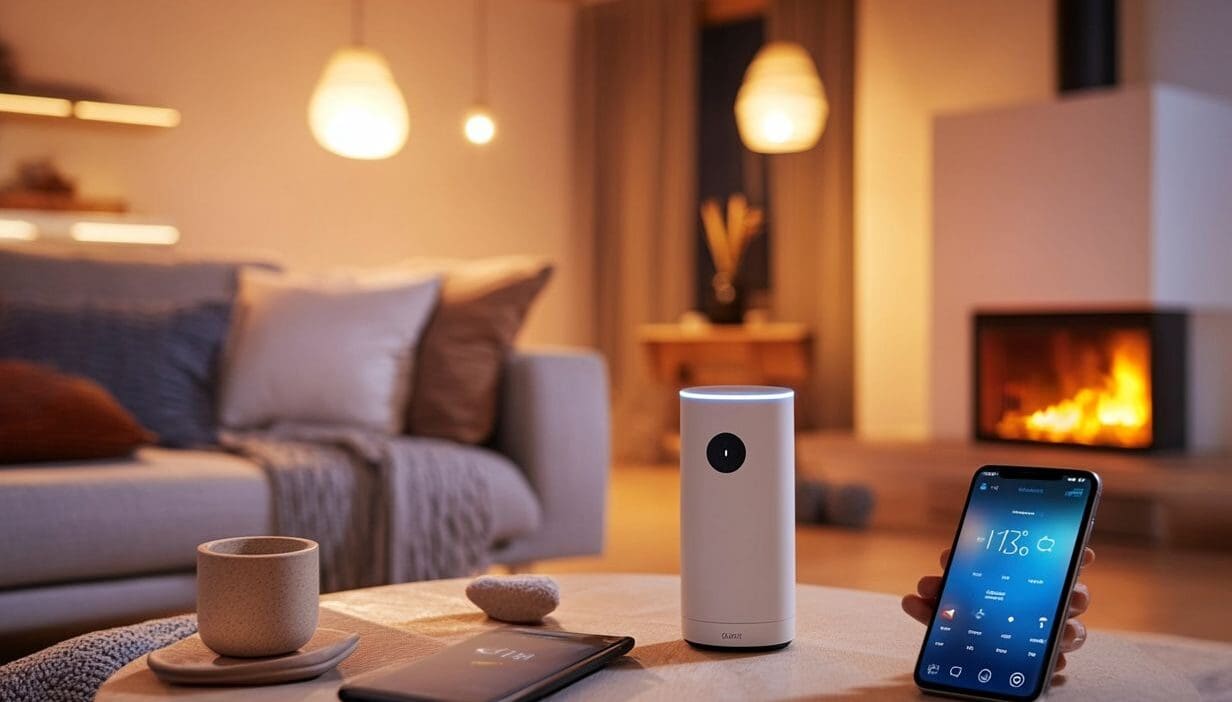Smart home technology is transforming contemporary living by providing increased convenience and efficiency, featuring smart home automation with time-saving devices in daily routines, optimizing energy consumption and enhancing home comfort. The automation of routine tasks and the streamlining of home life can result in significant savings in both time and financial resources. This article examines the time-saving advantages of smart home devices, ranging from smart thermostats to advanced security systems, including smart security and smart water-leak sensors, and provides practical guidance on how to incorporate these technologies into everyday activities. Adopting smart home technology has the potential to enhance one’s lifestyle while simultaneously increasing savings.
Key Takeaways:
What is Smart Home Technology?
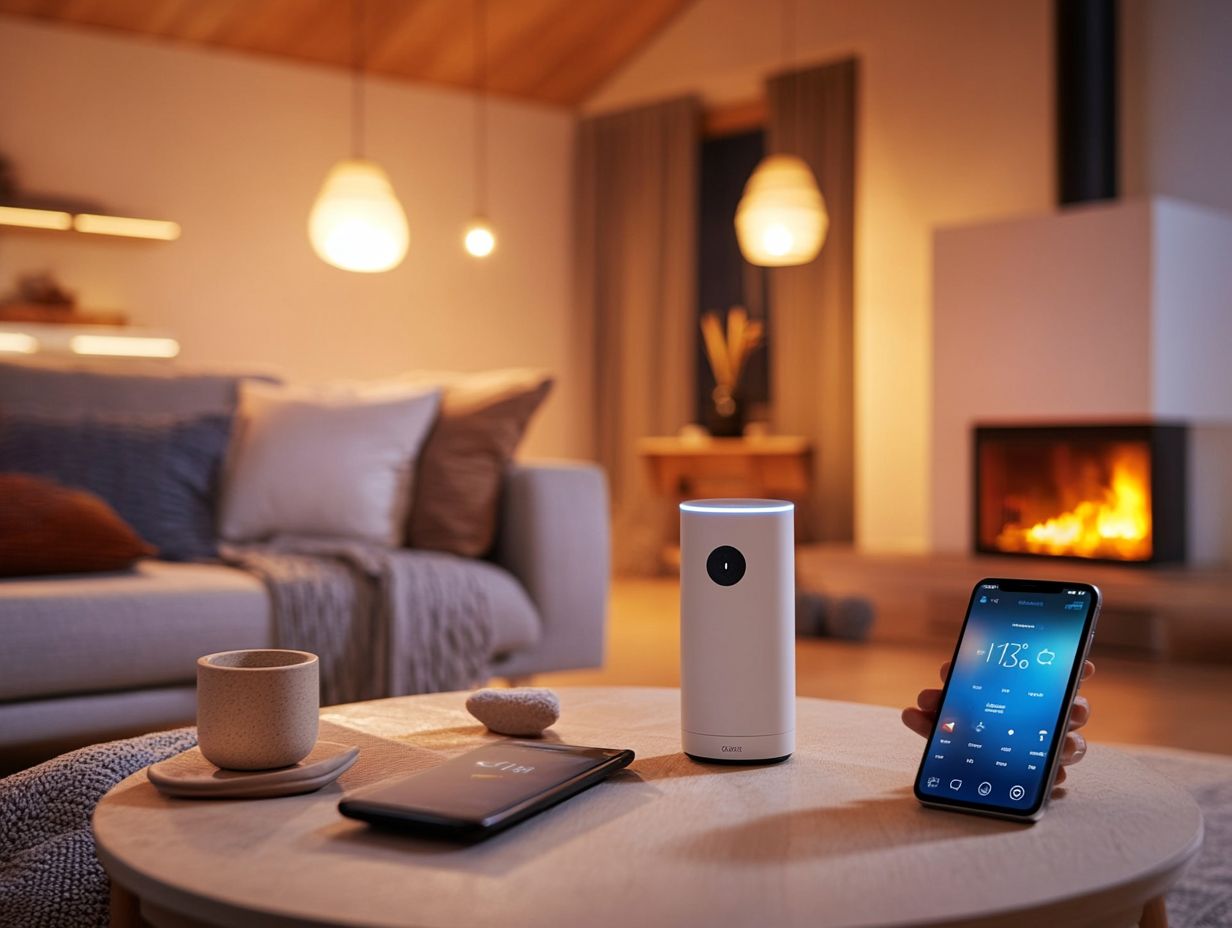
Smart home technology refers to the integration of various smart devices into a household system designed to enhance convenience, comfort, and energy efficiency. This technology enables users to automate their daily routines using devices such as smart plugs, smart thermostats, and energy-efficient lighting and smart bulbs. These smart devices work in conjunction with voice assistants like Google Nest and Amazon Alexa to create an intelligent living environment that anticipates and fulfills individual needs.
These devices typically communicate through a central hub, utilizing protocols such as Wi-Fi, Zigbee, or Z-Wave, which facilitates seamless connectivity across various platforms. For those interested in understanding how these communication methods work, an insightful guide from Family Handyman explores the intricacies of home automation protocols. By emphasizing automation for improved energy savings, smart home systems can adjust settings according to user preferences, such as automatically lowering the heating when occupants leave or dimming lights for movie time. These innovations not only contribute to reduced energy consumption and energy usage but also significantly enhance user comfort.
Notable products, such as the Nest Learning Thermostat, exemplify how adaptive technology can learn user habits over time, optimizing temperatures for maximum efficiency. Additionally, brands like Apple are incorporating their HomeKit framework to ensure an interconnected ecosystem that simplifies the management of all aspects within the smart home, ultimately providing a level of convenience that traditional systems cannot match.
Time-Saving Benefits of Smart Home Tech
The time-saving advantages of smart home technology can greatly enhance daily living by automating routine tasks and optimizing household operations, ultimately resulting in improved comfort within the home.
With the implementation of devices such as robot vacuums and smart appliances, users are able to streamline cleaning processes and manage household responsibilities more efficiently. This automation facilitates the establishment of schedules that free up valuable time, allowing individuals to allocate more time for leisure activities or productive endeavors, thereby leveraging the benefits of home automation. For those interested in a comprehensive overview of this transformation, Fast Company offers an insightful analysis on how smart home technology is reshaping daily life.
Automation and Efficiency
Automation and efficiency are essential elements of smart home technology, enabling homeowners to optimize energy usage and streamline daily routines with ease. Smart devices, such as programmable thermostats that adjust temperatures based on occupancy and smart lighting that can be controlled remotely, enhance home comfort while contributing to significant energy savings. According to a recent publication by Energy Star, these smart home technologies are instrumental in bundling energy savings with consumer interest.
For example, automated irrigation systems utilize weather data to water gardens and lawns only when necessary, thereby preventing water overuse and reducing utility expenses. Such solutions offer personalized settings, allowing homeowners to customize their environments according to their preferences and lifestyles.
Smart lighting systems can be programmed to dim or turn off during specific hours or in response to natural light levels, thereby enhancing efficiency while also creating a more pleasant atmosphere.
These technologies not only facilitate a more efficient household but also improve the overall living experience by providing comfort and peace of mind.
Streamlined Daily Tasks
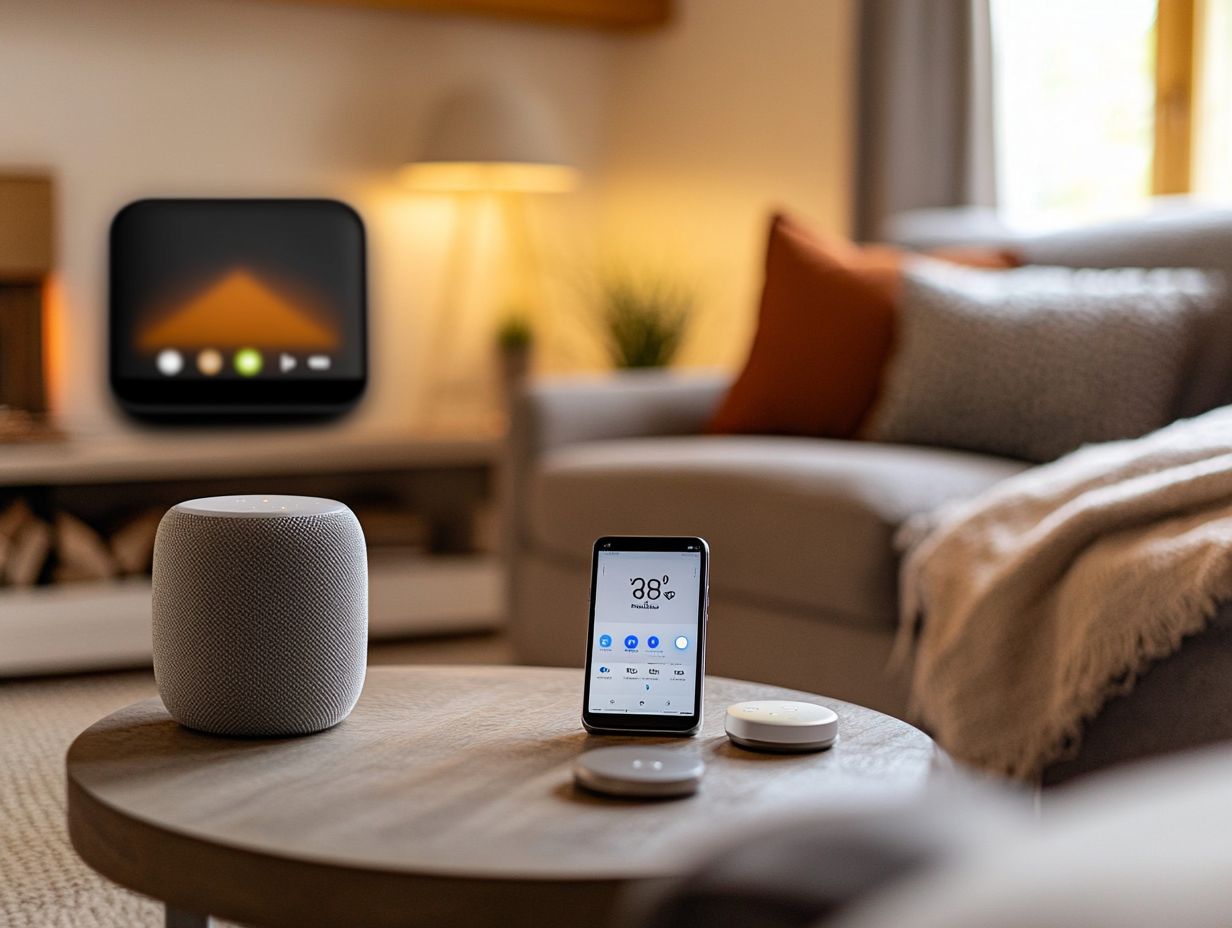
Streamlined daily tasks represent a significant advantage of smart home technology, which integrates various smart appliances and devices to facilitate the effortless management of household chores. For example, robotic vacuum cleaners can autonomously clean floors, while smart plugs manage power distribution to devices. This allows users to automate schedules for their appliances, thereby significantly enhancing their daily routines.
Consider a morning routine in which a smart coffee maker begins brewing coffee at a predetermined time, ensuring that the aromatic beverage is ready upon waking. Simultaneously, smart lighting can gradually illuminate, simulating a natural sunrise and helping withdividuals in easing into their day.
Furthermore, the ability to control appliances remotely via a smartphone application enables users to preheat the oven for dinner or adjust the thermostat to achieve the ideal temperature prior to returning home.
These straightforward yet effective integrations of smart devices can fundamentally transform the approach to household activities, resulting in a more efficient, comfortable, and connected lifestyle.
Top Smart Home Devices for Time Savings
The market offers a wide array of advanced smart home devices engineered, including smart outlets and variable-speed air conditioners, specifically for enhancing efficiency and saving time, seamlessly integrating convenience with cutting-edge technology to elevate daily living.
These innovative solutions range from brands like Dyson and Trane Heating & Air Conditioning, offering smart thermostats that optimize energy consumption to sophisticated security systems that ensure peace of mind. Additionally, automated appliances and smart doorbells contribute to enhanced security and convenience, rendering them essential components of contemporary households.
Smart Thermostats
Smart thermostats are transforming home energy efficiency by enabling users to program and control their heating and cooling systems remotely, thereby maximizing comfort while minimizing energy consumption. Devices such as the Nest Learning Thermostat and Ecobee, featuring self-regulating thermostats and smart features, are equipped with advanced features, including self-regulating technology, which allows homeowners to establish schedules that adapt to their lifestyles and preferences.
These innovative devices not only enhance user convenience but also contribute significantly to energy savings and home improvement, with certain models reporting reductions in monthly utility bills of up to 15%. With Wi-Fi connectivity, users can easily adjust their home’s temperature from virtually anywhere using their smartphones or tablets.
Furthermore, seamless integration with popular voice assistants like Amazon Alexa and Google Assistant facilitates straightforward voice command functionalities, simplifying the management of home environments.
When comparing different models, the Nest thermostat is noted for its sleek design and intuitive learning capabilities, while the Ecobee offers additional room sensors that help maintain balanced temperatures throughout the home. This illustrates the diverse range of options available for efficient energy management in contemporary residences.
Smart Security Systems
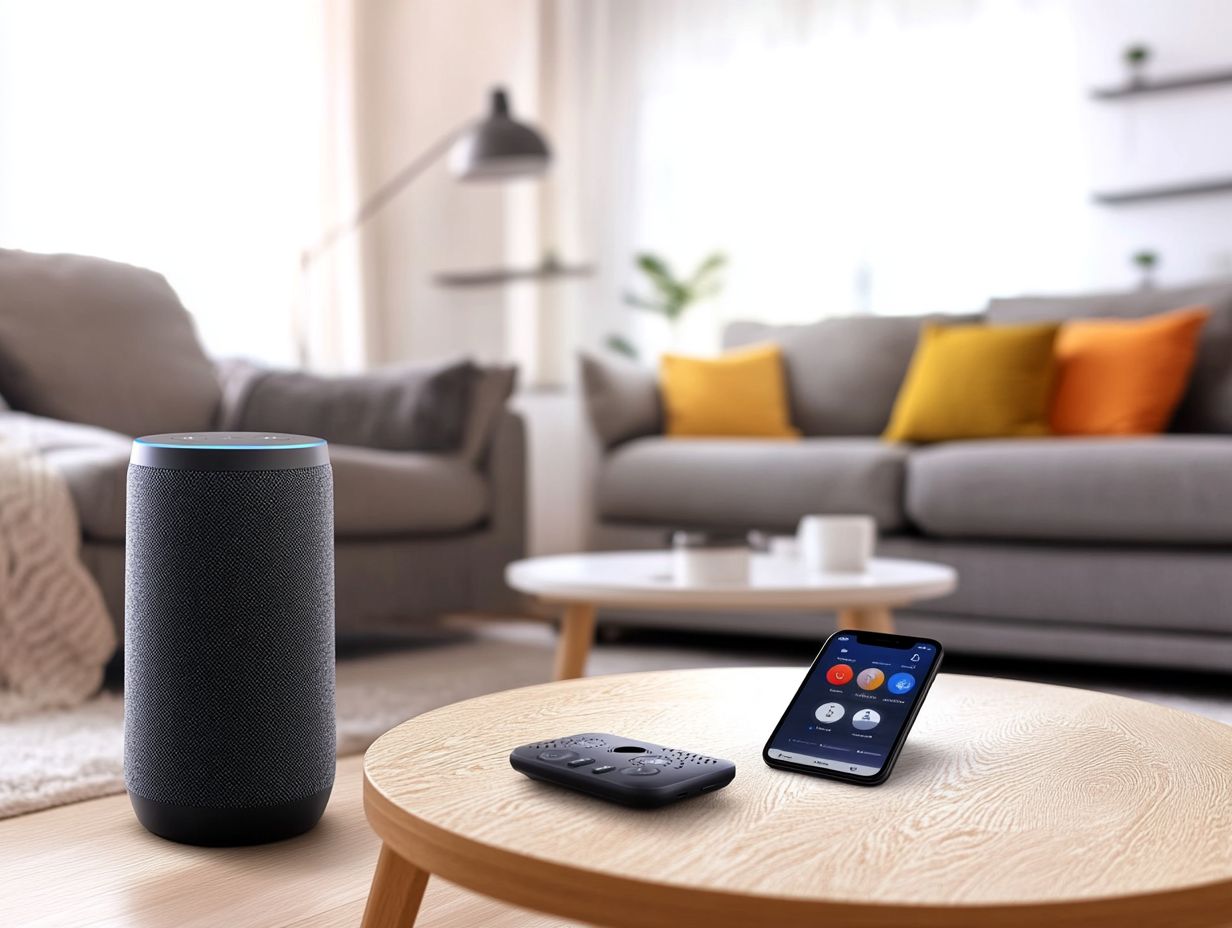
Smart security systems serve as essential components of modern smart homes, offering enhanced safety and monitoring capabilities that integrate effectively with home automation technologies. Devices such as smart doorbells and smart water-leak sensors enable homeowners to remain informed about their property’s security status and take proactive measures against potential issues.
These advanced systems include a range of tools, such as:
- Smart locks that facilitate keyless entry
- Indoor cameras that provide real-time activity monitoring
- Motion detectors that issue alerts to prevent unauthorized access
Their functionalities extend from remote access via smartphone applications to integration with voice assistants, ensuring user-friendliness.
Plus delivering significant security advantages, smart security devices foster energy efficiency by allowing users to monitor and control home energy consumption through automation. Ultimately, this combination of safety, convenience, and energy management provides homeowners with not only a greater sense of security but also the capability to optimize their living environment.
Smart Appliances
Smart appliances represent a significant advancement in household cleaning and management in home automation, designed to simplify and enhance the efficiency of household cleaning and management. These automated devices, which encompass a range of products from smart refrigerators to connected washing machines, incorporate energy-efficient solutions that offer users an array of enhanced features, supported by Energy Star ratings for improved functionality.
For example, a smart refrigerator can monitor food inventory and alert the user when items are approaching low stock or nearing expiration, thereby minimizing food waste and reducing the frequency of grocery store visits.
Raleigh, North Carolina is a place where similar innovations occur. In a similar vein, smart washing machines can be programmed through a mobile application to operate during off-peak energy hours, facilitating electricity conservation and lowering utility costs.
Furthermore, devices such as smart thermostats have the capability to learn user behaviors, adjusting heating and cooling settings accordingly, which can lead to significant energy savings.
As the adoption of these appliances continues to rise, they not only improve convenience and comfort in everyday living but also foster sustainable practices, ultimately contributing to a more efficient household.
How to Incorporate Smart Home Tech into Your Routine, Featuring Insights from Anthony Carrino and Heather LaBoda
The integration of smart home technology into daily routines can significantly improve convenience, comfort, and energy efficiency, fundamentally transforming the management of household tasks. Imagine living like The Jetsons with smart devices like Google Nest, Amazon Alexa, and Apple HomeKit.
By strategically incorporating smart devices and utilizing automated schedules for cleaning and energy-efficient lighting, homeowners can develop a seamless experience tailored to their lifestyle requirements, endorsed by experts like Architectural Digest and HGTV.
Tips for Setting up and Using Devices with Recommendations from Raleigh, North Carolina Experts
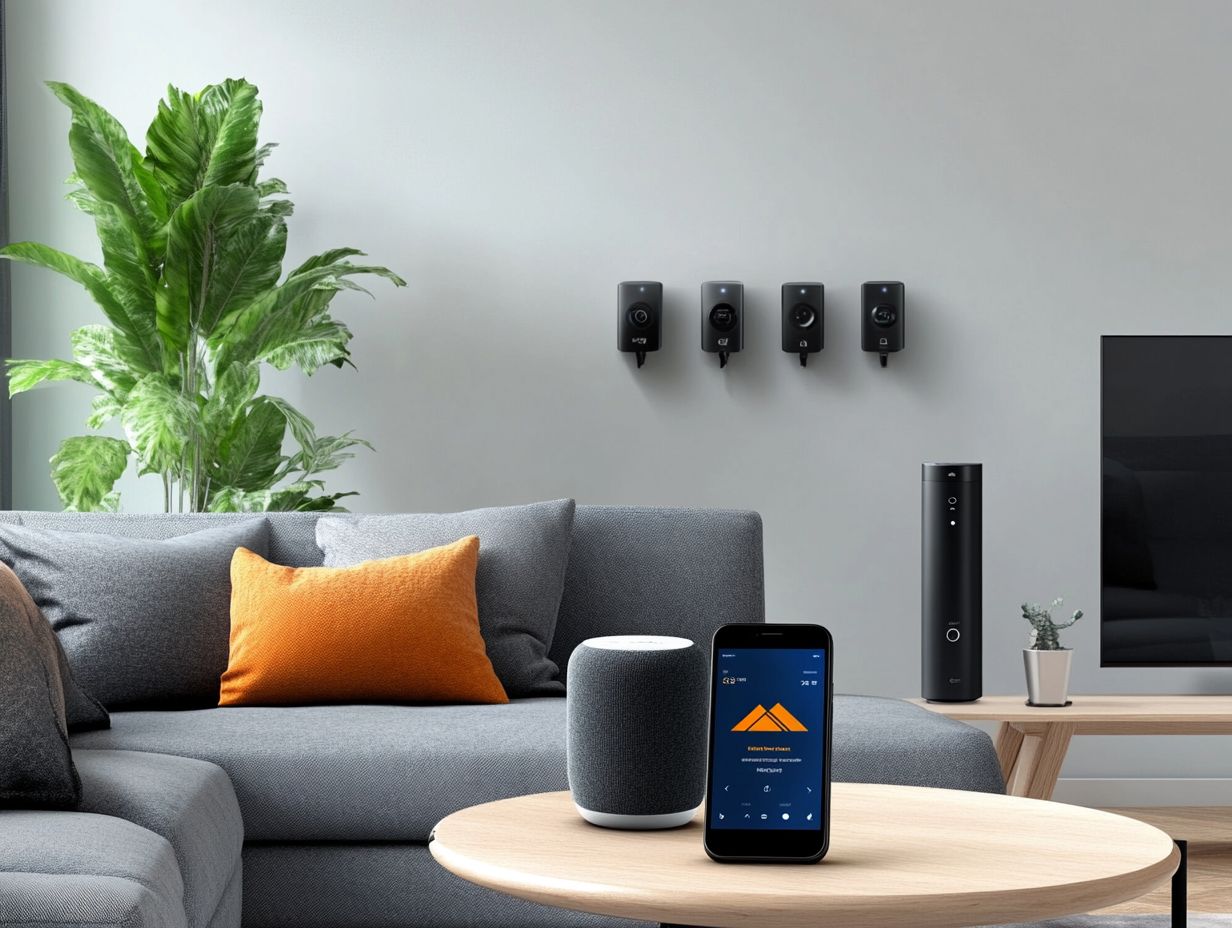
Setting up and utilizing smart devices effectively necessitates a strategic approach to fully realize their advantages and integrate them seamlessly into home automation systems. By adhering to practical guidelines for configuration and management, users can take advantage of automated schedules that promote energy efficiency while enhancing comfort and convenience.
To begin, it is crucial to thoroughly review the instructions provided by the manufacturer, as each device may have a distinct setup procedure.
- First, ensure that your home network is sufficiently robust to accommodate multiple devices, with particular attention paid to Wi-Fi range and compatibility with devices such as Google Nest and Amazon Alexa.
- When pairing devices, maintaining close proximity to the hub or smartphone application can help eliminate potential connection issues, especially for devices like Nest Learning Thermostat and Ecobee.
It is also advisable to regularly check for software updates, as these can significantly improve the device’s performance and security. Furthermore, utilizing the accompanying applications to monitor energy usage and track device performance allows for necessary adjustments that align with daily routines and personal preferences. Consider using apps like Nix Mini 3 for color-matching or Apple Vision Pro for an augmented reality setup.
Potential Cost Savings with Smart Home Tech, Backed by Energy Star and BKV Energy
The potential cost savings associated with smart home technology are considerable, primarily realized through decreased energy consumption and optimized utility management, as evidenced by experts from Asurion and The Energy Resource Center.
By integrating smart devices specifically designed for energy efficiency, homeowners can substantially reduce their utility expenses while simultaneously benefiting from improved comfort and convenience.
Energy and Utility Bill Savings with Trane Heating & Air Conditioning Solutions
The adoption of smart home technology yields immediate benefits, particularly in the area of energy and utility bill savings. Users can effectively manage their energy consumption through the utilization of smart thermostats, energy-efficient lighting, and intelligent appliances. These devices work collaboratively to optimize usage patterns, resulting in substantial reductions in utility expenses. Using devices such as Serena smart shades can further reduce energy usage.
For example, a smart thermostat is capable of learning the homeowner’s schedule and adjusting the temperature accordingly, thereby preventing unnecessary heating or cooling when the residence is unoccupied. Research has demonstrated that such devices can reduce heating and cooling costs by as much as 30%. Notable products like the Nest Learning Thermostat and Ecobee have been particularly effective in achieving these savings.
Additionally, smart lighting systems can automatically deactivate lights in unoccupied rooms or adjust brightness levels in response to the availability of natural light, further enhancing energy conservation. Empirical data indicates that households implementing these technologies experienced an average reduction of 25% in their monthly electricity bills, highlighting the significant impact of smart devices on effective energy management. Explore the latest advancements in these technologies with insights from technology curiosities and digital marketing trends featured in Dyson and The Jetsons inspired solutions.
